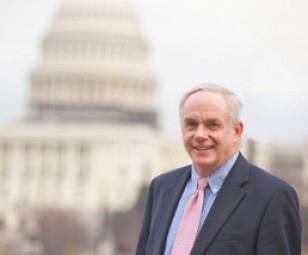Surprise Visit to Afghanistan on Anniversary of OBL’s Demise

President Obama greets U.S. troops at Bagram Air Force Base outside Kabul after signing accord with Afghan President Hamid Karzai. Photo: Reuters
President Obama injected some foreign policy drama into the 2012 election campaign with his middle-of-the-night surprise trip to Afghanistan. The pictures of Air Force One appearing out of the gloomy darkness at Bagram Air Base and the president giving the troops a pep talk were strong images to project on the one-year anniversary of the death of al Qaida leader Osama bin Laden.
The Obama campaign kicked off the bin Laden anniversary by issuing a campaign video featuring commentary from former President Bill Clinton on the tense moments when the raid was approved and carried out by Navy Seals. That brought complaints from the Mitt Romney camp that the president was doing the very thing he promised not to, use the anniversary for political purposes to bolster his foreign policy credentials.
Romney appeared in New York City with former Mayor Rudy Giuliani at a firehouse where he took the opportunity to rebut the Obama campaign contention that he might have hesitated to authorize the raid that killed bin Laden. But Romney was interrupted by a lone heckler at times and the images of him serving pizza to firefighters paled in comparison to the pictures coming out of Afghanistan of Mr. Obama carrying out his duties as commander-in-chief.

Republican Presidential hopeful Mitt Romney (R) marks the anniversary of Osama bin Laden's death at a New York fire station with former Mayor Rudy Giuliani. Photo: Reuters
You may ask why the Romney campaign even bothered to try and go toe-to-toe with the White House on the bin Laden anniversary. It’s true that this election will likely be decided on the state of the U.S. economy and whether American voters have enough confidence to rehire President Obama for another four years to guide that economy.
But at the same time, presidential candidates challenging incumbent presidents must be able to present their own foreign policy credentials and make the case to voters that they would be a credible commander-in-chief if elected. Especially in the wake of the 2001 terrorist attacks, Americans expect the president to first and foremost be focused on national security and making sure the country is safe from terrorist attack.
I believe that’s the major reason why President George W. Bush won re-election in 2004. While the war in Iraq had divided Americans, voters reverted to their usual pattern of not turning out of office a war president.
On the other hand, the lesson of President Bush’s father, George H.W. Bush, is also instructive.
The first President Bush had astronomical approval ratings in 1991 following the successful Persian Gulf War to evict Iraqi forces from Kuwait. Mr. Bush’s popularity was so strong that some prominent Democrats decided not to run for president in 1992 fearing they had no chance against the man who led the country and U.S. allies to victory in the Gulf War.
But voter attention in 1992 quickly moved on from the war to economic problems at home, and one of the Democrats who quickly took note of the shift was a little known governor from Arkansas named Bill Clinton. Clinton used his charm and formidable political skills to win the Democratic Party’s presidential nomination that year and then used voter discontent over the state of the economy to win the election in November, with a little help from independent presidential candidate H. Ross Perot.
Public opinion polls give President Obama an advantage this year on foreign policy issues. Much of the public is tired of the wars in Afghanistan and Iraq and believes it’s time to invest more at home.
Four years ago, when Mr. Obama won the White House, the economy and a desire for change dominated the election campaign. That was a shift from four years earlier when the 2001 terror attacks were still fresh in the public’s mind and the No. 1 emphasis remained protecting the country from further attacks.
The outcome in 2012 is also likely to be determined by the economy, and the Romney camp knows it will be their strongest argument to the public in hopes of turning Mr. Obama out of office. The bin Laden killing has given the Obama administration an achievement to point to on the foreign policy front and is the No. 1 reason why the president has an advantage in the foreign policy area over Romney.
Historically, this is somewhat strange territory for a Democrat. Since Richard Nixon won in 1968 and again in 1972, voters have generally given the Republican Party the advantage on foreign policy issues.
Democrats got much of the blame for the Vietnam War, having ramped up the military effort under presidents John Kennedy and Lyndon Johnson. Jimmy Carter’s re-election hopes probably crashed when the helicopter mission failed to rescue the U.S. hostages in Iran in 1980, and both Presidents’ Bush and Ronald Reagan were given higher marks than their Democratic opponents on foreign policy issues.
John McCain was seen as vastly more experienced on military and foreign policy matters in 2008. But the public was tired of the military involvements during the Bush years and then-candidate Obama’s relative inexperience did not seem to hurt him with voters.
Now in 2012, the president finds himself in the somewhat unexpected position of having an advantage on foreign policy heading into November, and you can bet we will hear a lot more about that as the campaign goes on.

